Hukat (Statute) – Numbers 19:1 – 22:1
Numbers 20 presents a fascinating story, the story of the death of Miriam and the subsequent loss of water. Verse two: And the nation settled in Kadesh and Miriam died there and was buried there. Verse three: And there was no water for the nation.

